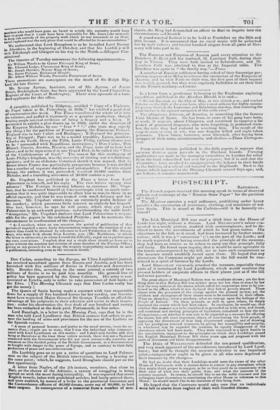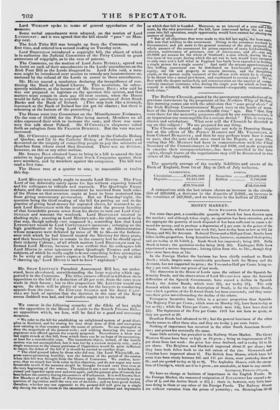The Irish Municipal Bill was read a third time in
the House of Lord; last night, without a divisor'. Lord MELBOURNE'S valour eva- porated in a wordy protest, studded with commonplaces; and he de- clined to move the amendments of which he bad given notice. His objections to the bill, as it stood, had been increased by further exumi- liati1111 ; still, it was a " concession " (!) on the part of the Lords ; and
be much regretted, that having conceded the principle of the measure, they had been so unwise as to refuse to carry out that principle fully and fairly. He found upon inquiry, that it would be more agreeable to
the towns unincorporated by the bill, not to have such corporations as the measure would establish forced upon them. He hoped that any alterations the Commons might yet make in the bill would be con- sidered in a spirit of fairness by the Lords.
Lord Bnoceitast vigorously attacked the measure, especially those parts of it introduced by Lord Lyndhurst, which would continue the present holders of corporate officers in their places just as if the bill bad never passed_ Thegreat object of Municipal Reform was to eradicate abuses; yet the first thing done in this Reform Bill was neither more nor less than to enact by law
that the very authors of the abuses which called for suppression were to be con- tiptoed in the offices which it was declared they had so grossly abused. These abuses were the gravatnen of the charge against the present system, yet the children and champions of these abuses were to be continued in their offices. What an absurdity, what a mockery, what air outrage upon the feelings of the People of Ireland. On these grounds, as well as upon others, be deeply lamented the course which had been taken. In conclusion, he would may, that whether this measure was tube considered as grounded on truly wise, and sound, and consistent and abiding principles of legislation, calculated to bear the test
of exits!' ience,—or whether it was only to be regarded as a measure for effecting the ttt i t tor, but still most important object, of conciliating the Irish people, of appeasing the discontents of that long ill-governed country, and of drawing out her prodigious internal resources, by giving her tranquillity and security, in whichever way he regarded the measure, he equally disapproved of the alterations which had been made. They were conceived in a spirit hostile to
the constitution, repugnant to the principles on which their Lordships pawed the English Municipal Reform Bill three years ago, stud pregnant with the seeds of discontent and bitter disappointment.
The Duke of WELLINGTON defended the ten-pound qualification, and very much approved of the amendment's introduced by Lord Lynd- hurst ; but still he thought the measure defective in one important point—compensation ought to be given to all who were deprived of their incomes by the change— Ile hail no doubt that their Lordships would meet the views of the other House of Parliament, with a sincere desire to concur in any alteration. which they might think proper to suggest, as far as they could do so consistently with their view of what was their public duty, and what the interests of the country required. In return, he should like to see the noble viscount and his colleagues exert themselves in conciliating the other House in reference to this House : he should much like to see instances of this being done.
He hoped that the Commons would take care that no individuals were left to starve from neglect of their well-founded claims. Lord WICKLOW spoke in terms of general approbation of the measure.
Some verbal amendments were adopted, on the motion of Lord LYNDHU RST : and it was agreed that the bill should " pass " on Mon- day next.
The Irish Tithe Bill was brought up from the Commons, read a first time, and ordered tort second reading on Tuesday next.
Lord BROUGHAM introduced a copyright bill, the object of which is to authorize the Judicial Committee of the Privy Council to grant extensions of copyright, as in the case of patents.
The Commons, on the motion of Lord JOHN RUSSELL, agreed not to insist on such of their amendments to the Lords' amendments on the Irish Poor Bill as the Lords disagreed to. Lord John said, a mea- sure might be introduced next session to remedy any inconvenience oc- casioned by the refusal of the Lords to assent to those amendments.
Mr. HUME moved a resolution declaring the inexpediency of con- tinuing the Bank of Ireland Charter. This resolution, he subse- quently withdrew, at the instance of Mr. SPRING RICE; who said he was not prepared to legislate on the question this session, and that matters must remain in state quo till next session, when the House would be fully at liberty to consider the entire question of Joint Stock Banks and the Bank of Ireland. This may look like a triumph, inasmuch as the Bank of Ireland has not got its charter; but there is scheming at the bottom of the proceeding.] The House went into Committee on the Miscellaneous Estimates. On the vote of 10,000/. for the Poles being moved, Members on all sides expressed their wish to increase the sum ; and there was some very fine talk about Poland. Mr. O' CONNELL'S eloquence called forth an eulogium from Sir FRANCIS BURDETT. But the vote WRS not increased.
Mr. O'CONNELL opposed the grant of 1,000/. to the Catholic Bishop of Quebec, and 75/. to the Catholic Bishop of Newfoundland ; and descanted on the iniquity of compelling people to pay the ministers of churches from whose creed they dissented. There was no division, however, on this or any other motion.
Mr. SPRING RICE obtained leave to bring in a bill to amend the law relative to legal proceedings of Joint Stock Companies against their own members, and by members against the companies. The bill was read a first time.
The House rose at a quarter to one; to reassemble at twelve this day.



























 Previous page
Previous page